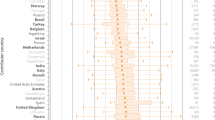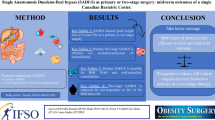Abstract
Background
Due to the failure of the “old Mason loop,” the mini-gastric bypass (MGB) has been viewed with skepticism. During the past 12 years, a growing number of authors from around the world have continued to report excellent short- and long-term results with MGB.
Methods
One university center, three regional hospitals, and two private hospitals participated in this study. From July 2006 to December 2012, 475 men (48.8 %) and 499 women (51.2 %) underwent 974 laparoscopic MGBs. The mean age of these patients was 39.4, and their preoperative body mass index was 48 ± 4.58 kg/m2. Type 2 diabetes mellitus (T2DM) affected 224 (22.9 %) of the 974 patients, whereas 291 of the 974 patients (29.8 %) presented with hypertension. The preoperative gastrointestinal status was explored in all the patients through esophagogastroduodenoscopia. The major end points of the study were definitions of both MGB safety and efficacy in the long term as well as the endoscopic changes in symptomatic patients eventually produced by surgery.
Results
The rate of conversion to open surgery was 1.2 % (12/974), and the mortality rate was 0.2 % (2/974). The perioperative morbidity rate was 5.5 % (54/974), with 20 (2 %) of the 974 patients requiring an early surgical revision. The mean hospital length of stay was 4.0 ± 1.7 days. At this writing, 818 patients are being followed up. Late complications have affected 74 (9 %) of the 818 patients. The majority of these complications (66/74, 89.1 %) have occurred within 1 year after surgery. Bile reflux gastritis was symptomatic, with endoscopic findings reported for 8 (0.9 %) and acid peptic ulcers for 14 (1.7 %) of the 818 patients. A late revision surgery was required for 7 (0.8 %) of the 818 patients. No patient required revision surgery due to biliary gastritis. At 60 months, the percentage of excess weight loss was 77 ± 5.1 %, the T2DM remission was 84.4 %, and the resolution of hypertension was 87.5 %.
Conclusions
Despite initial skepticism, this study, together with many other large-scale, long-term similar studies from around the world (e.g., Taiwan, United States, France, Spain, India, Lebanon) demonstrated the MGB to be a short, simple, low-risk, effective, and durable bariatric procedure.


Similar content being viewed by others
References
Rutledge R (2001) The mini-gastric bypass: experience with the first 1,274 cases. Obes Surg 11:276–280
Rutledge R, Walsh W (2005) Continued excellent results with the mini-gastric bypass: six-year study in 2,410 patients. Obes Surg 15:1304–1308
Lee WJ, Yu PJ, Wang W et al (2005) Laparoscopic Roux-en-Y versus mini-gastric bypass for the treatment of morbid obesity. Ann Surg 242:20–28
Carbajo MA, Garcia-Caballero M, Toledano M et al (2005) One anastomosis gastric bypass by laparoscopy: results of the first 209 patients. Obes Surg 15:398–404
Chakhtoura G, Zinzindohoué F, Ghanem Y, Ruseykin I, Dutranoy JC, Chevallier JM (2008) Primary results of laparoscopic mini-gastric bypass in a French obesity-surgery specialized university hospital. Obes Surg 18:1130–1133
Peraglie C (2008) Laparoscopic mini-gastric bypass (LMGB) in the super–super obese: outcomes in 16 patients. Obes Surg 18:1126–1129
Piazza L, Ferrara F, Leanza S, Coco D, Sarvà S, Bellia A, Di Stefano C, Basile F, Biondi A (2011) Laparoscopic mini-gastric bypass: short-term single-institute experience. Updates Surg 63:239–242
Noun R, Skaff J, Riachi E, Daher R, Antoun NA, Nasr M (2012) One thousand consecutive mini-gastric bypass: short- and long-term outcome. Obes Surg 22:697–703
Lee WJ, Wang W, Lee YC, Huang MT, Ser KH, Chen JC (2008) Laparoscopic mini-gastric bypass: experience with tailored bypass limb according to body weight. Obes Surg 18:294–299
Mason EE, Ito C (1967) Gastric bypass in obesity. Surg Clin North Am 47:1345–1351
Fisher BL, Buchwald H, Clark W, Champion JK, Fox SR, MacDonald KG, Mason EE, Terry BE, Schauer PR, Sugerman HJ (2001) Mini-gastric bypass controversy. Obes Surg 11:773–777
Johnson WH, Fernanadez AZ, Farrell TM, Macdonald KG, Grant JP, McMahon RL, Pryor AD, Wolfe LG, DeMaria EJ (2007) Surgical revision of loop (“mini”) gastric bypass procedure: multicenter review of complications and conversions to Roux-en-Y gastric bypass. Surg Obes Relat Dis 3:37–41
Collins BJ, Miyashita T, Schweitzer M, Magnuson T, Harmon JW (2007) Gastric bypass: why Roux-en-Y? A review of experimental data. Arch Surg 142:1000–1003
Chevallier JM, Chakhtoura G, Zinzindohoué F (2009) Laparoscopic mini-gastric bypass. J Chir Paris 146:60–64
Kim Z, Hur KY (2011) Laparoscopic mini-gastric bypass for type 2 diabetes: the preliminary report. World J Surg 35:631–636
Lee WJ, Ser KH, Lee YC, Tsou JJ, Chen SC, Chen JC (2012) Laparoscopic Roux-en-Y vs mini-gastric bypass for the treatment of morbid obesity: a 10-year experience. Obes Surg 22:1827–1834
Lee WJ, Chong K, Ser KH, Lee YC, Chen SC, Chen JC, Tsai MH, Chuang LM (2011) Gastric bypass vs sleeve gastrectomy for type 2 diabetes mellitus: a randomized controlled trial. Arch Surg 146:143–148
Musella M, Milone M, Bellini M et al (2012) Effect of bariatric surgery on obesity-related infertility. Surg Obes Relat Dis 8:445–449
www.sicob.org. Accessed 24 Sept 2012
Muñoz R, Ibáñez L, Salinas J, Escalona A, Pérez G, Pimentel F, Guzmán S, Boza C (2009) Importance of routine preoperative upper GI endoscopy: why all patients should be evaluated? Obes Surg 19:427–431
Inzucchi SE, Bergenstal RM, Buse JB, Diamant M, Ferrannini E, Nauck M, Peters AL, Tsapas A, Wender R, Matthews DR (2012) Management of hyperglycaemia in type 2 diabetes: a patient-centered approach. Position statement of the American Diabetes Association (ADA) and the European Association for the Study of Diabetes (EASD). Diabetologia 55:1577–1596
Chevallier JM, Trelles N, Arienzo R, Jamal W, Chakhtoura G, Zinzindohoué F (2011) Endoscopic findings after laparoscopic omega loop gastric bypass. Obes Surg 21:956
Caygill CP, Hill MJ, Kirkham JS, Northfield TC (1986) Mortality from gastric cancer following gastric surgery for peptic ulcer. Lancet 1:929–931
Viste A, Bjørnestad E, Opheim P, Skarstein A, Thunold J, Hartveit F, Eide GE, Eide TJ, Søreide O (1986) Risk of carcinoma following gastric operations for benign disease: a historical cohort study of 3,470 patients. Lancet 2:502–505
Lundegårdh G, Adami HO, Helmick C, Zack M, Meirik O (1988) Stomach cancer after partial gastrectomy for benign ulcer disease. N Engl J Med 319:195–200
Fischer AB, Graem N, Jensen OM (1983) Risk of gastric cancer after Billroth II resection for duodenal ulcer. Br J Surg 70:552–554
Tokudome S, Kono S, Ikeda M, Kuratsune M, Sano C, Inokuchi K, Kodama Y, Ichimiya H, Nakayama F, Kaibara N et al (1984) A prospective study on primary gastric stump cancer following partial gastrectomy for benign gastroduodenal diseases. Cancer Res 44:2208–2212
Ito M, Takata S, Tatsugami M et al (2009) Clinical prevention of gastric cancer by Helicobacter pylori eradication therapy: a systematic review. J Gastroenterol 44:365–371
Tersmette AC, Offerhaus GJ, Tersmette KW, Giardiello FM, Moore GW, Tytgat GN, Vandenbroucke JP (1990) Meta-analysis of the risk of gastric stump cancer: detection of high-risk patient subsets for stomach cancer after remote partial gastrectomy for benign conditions. Cancer Res 50:6486–6489
Offerhaus GJ, Tersmette AC, Giardiello FM, Huibregtse K, Vandenbroucke JP, Tytgat GN (1992) Evaluation of endoscopy for early detection of gastric-stump cancer. Lancet 340:33–35
Bassily R, Smallwood RA, Crotty B (2000) Risk of gastric cancer is not increased after partial gastrectomy. J Gastroenterol Hepatol 15:762–765
Scozzari G, Trapani R, Toppino M, Morino M (2013) Esophagogastric cancer after bariatric surgery: systematic review of the literature. Surg Obes Relat Dis 9:133–142
Hutter MM, Schirmer BD, Jones DB, Ko CY, Cohen ME, Merkow RP, Nguyen NT (2011) First report from the American College of Surgeons Bariatric Surgery Center Network: laparoscopic sleeve gastrectomy has morbidity and effectiveness positioned between the band and the bypass. Ann Surg 254:410–422
Padwal R, Klarenbach S, Wiebe N, Birch D, Karmali S, Manns B, Hazel M, Sharma AM, Tonelli M (2011) Bariatric surgery: a systematic review and network meta-analysis of randomized trials. Obes Rev 12:602–621
O’Brien PE, MacDonald L, Anderson M, Brennan L, Brown WA (2013) Long-term outcomes after bariatric surgery: fifteen-year follow-up of adjustable gastric banding and a systematic review of the bariatric surgical literature. Ann Surg 257:87–94
Gill RS, Birch DW, Shi X, Sharma AM, Karmali S (2010) Sleeve gastrectomy and type 2 diabetes mellitus: a systematic review. Surg Obes Relat Dis 6:707–713
Higa K, Ho T, Tercero F, Yunus T, Boone KB (2011) Laparoscopic Roux-en-Y gastric bypass: 10-year follow-up. Surg Obes Relat Dis 7:516–525
Acknowledgments
Authors would like to thank Prof. M. Taglialatela and Dr. P. Bianco for their precious support.
Disclosure
M. Musella, A. Susa, F. Greco, M. De Luca, E. Manno, C. Di Stefano, M. Milone, R. Bonfanti, G. Segato, A. Antonino, and L. Piazza have no conflicts of interest or financial ties to disclose.
Author information
Authors and Affiliations
Corresponding author
Rights and permissions
About this article
Cite this article
Musella, M., Susa, A., Greco, F. et al. The laparoscopic mini-gastric bypass: the Italian experience: outcomes from 974 consecutive cases in a multicenter review. Surg Endosc 28, 156–163 (2014). https://doi.org/10.1007/s00464-013-3141-y
Received:
Accepted:
Published:
Issue Date:
DOI: https://doi.org/10.1007/s00464-013-3141-y




